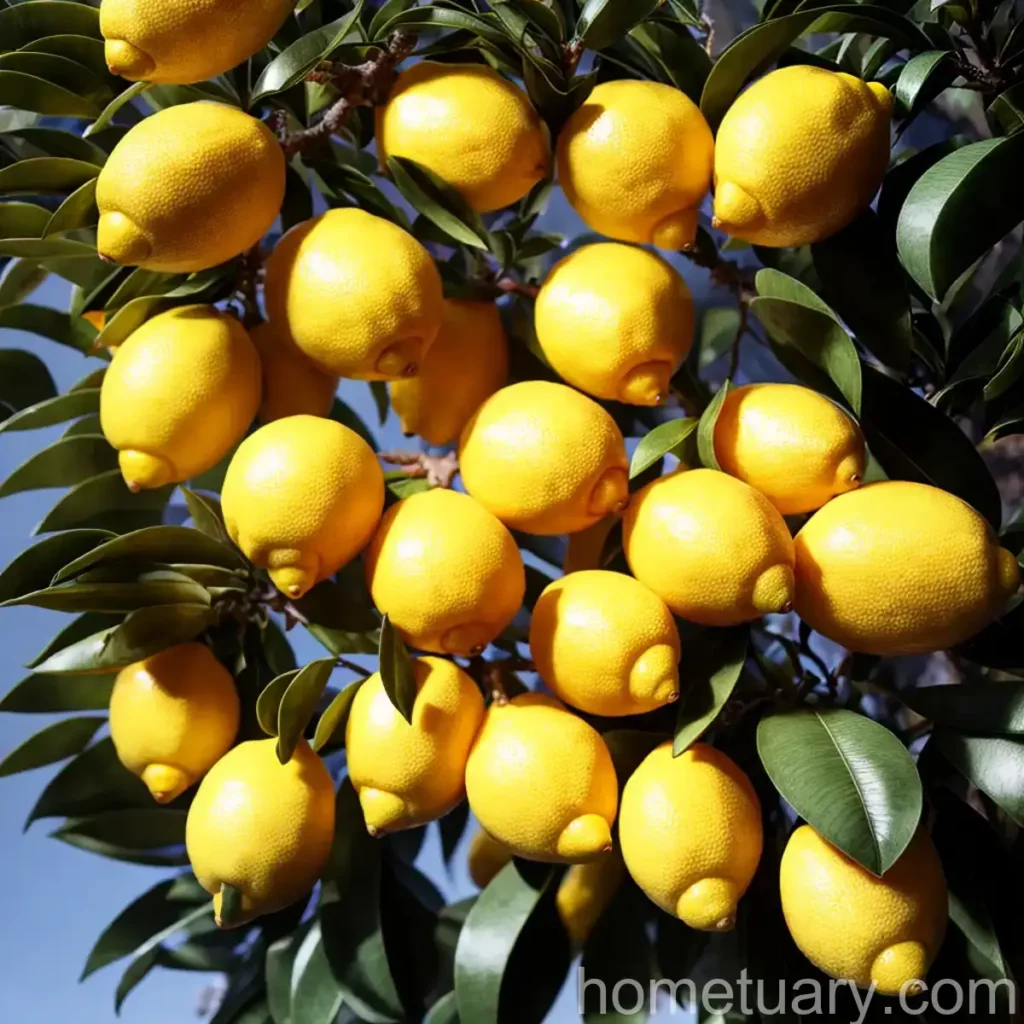Meyer Lemon (Citrus x meyeri): The Ultimate Guide
The Meyer lemon (Citrus x meyeri) is a popular citrus fruit tree known for its aromatic and flavorful fruits. This versatile plant is a favorite among gardeners, both for its beauty and its culinary uses. In this comprehensive guide, we will delve into the various aspects of Meyer lemon cultivation, including care, propagation, common diseases, and more. Whether you are a seasoned gardener or a beginner plant enthusiast, this guide will provide you with valuable insights into the world of Meyer lemon.
What is Meyer Lemon (Citrus x meyeri)?
The Meyer lemon, scientifically known as Citrus x meyeri, is a hybrid citrus fruit thought to be a cross between a true lemon (Citrus limon) and either a mandarin or sweet orange. It is named after Frank N. Meyer, a plant explorer who discovered the plant in China in 1908. Meyer lemons are small to medium-sized citrus fruits with a smooth, thin, deep yellow to orange-colored skin. They are slightly sweeter and less acidic than true lemons, making them a popular choice for culinary applications.
Key Takeaways – Meyer Lemon (Citrus x meyeri)
before diving into the detailed aspects of Meyer lemon care and cultivation, let’s take a look at some key takeaways about this delightful citrus plant.
- Scientific Name: Citrus x meyeri
- Common Name: Meyer Lemon
- Plant Type: Evergreen small tree
- USDA Hardiness Zones: 9-11
- Fruit Taste: Sweet, slightly acidic
- Fruit Color: Deep yellow to orange
- Uses: Culinary, ornamental
Culture
The culture of Meyer lemon encompasses various aspects of its care, including watering, sunlight, fertilizer, soil, and pruning. Proper understanding and implementation of these cultural practices are essential for the health and productivity of the Meyer lemon tree.
Uses
The Meyer lemon tree has both ornamental and practical uses. The tree itself is an attractive addition to gardens and landscapes, with its glossy green leaves and fragrant blossoms adding aesthetic value. Additionally, the fruits of the Meyer lemon tree are highly prized for their culinary significance. They are used in a wide range of dishes, from savory to sweet, and also in herbal medicine and skincare.
Water
Proper watering is crucial for the health and yield of Meyer lemon trees. These trees prefer consistently moist but well-drained soil. During the growing season, water the tree deeply whenever the top inch of soil feels dry to the touch. Be cautious not to overwater, as excessive moisture can lead to root rot and other issues.
Sunlight
Meyer lemon trees thrive in full sunlight. Provide at least 8-12 hours of direct sunlight per day for optimal growth and fruit production. In regions with scorching summers, providing some afternoon shade can be beneficial to prevent leaf scorch.
Fertilizer
Fertilizing Meyer lemon trees is important for promoting healthy growth and fruiting. Use a balanced, slow-release fertilizer formulated specifically for citrus trees. Apply the fertilizer in early spring before new growth begins and again in late summer to support fruit development.
Soil
Well-draining, slightly acidic soil with a pH range of 5.5 to 6.5 is ideal for Meyer lemon trees. Avoid heavy clay soils that can lead to waterlogging. Amending the soil with organic matter such as compost or well-rotted manure can improve both drainage and nutrient retention.
Pruning
Regular pruning is essential for shaping the tree, managing its size, and promoting air circulation within the canopy. Pruning should be carried out after the fruiting season to avoid removing potential fruiting wood. Remove dead or damaged branches, suckers, and any growth that congests the center of the tree.
Propagation
Propagating Meyer lemon trees can be done through several methods, including seeds, cuttings, and grafting. Each method has its advantages and considerations, and the choice of propagation method can impact the growth and productivity of the resulting tree.
Seed Propagation
Growing Meyer lemon trees from seeds is possible, but it is essential to note that the resulting tree may not exhibit the same characteristics as the parent plant due to genetic variation. If you choose to propagate from seeds, select seeds from ripe fruits and plant them in a well-draining potting mix. Keep the soil consistently moist and provide warmth to facilitate germination.
Cutting Propagation
Propagating Meyer lemon trees from cuttings is a popular method to maintain the desirable traits of the parent plant. Select healthy, semi-hardwood cuttings from the current season’s growth, and remove the lower leaves. Dip the cut end in rooting hormone and plant it in a well-draining rooting medium. Keep the cutting consistently moist and provide bottom heat to encourage root development.
Grafting
Grafting is a widely used propagation method to ensure that the resulting tree retains the exact characteristics of the parent plant. Common grafting techniques for Meyer lemon trees include T-budding and cleft grafting. Select a compatible rootstock and scion wood from healthy, disease-free plants, and follow the appropriate grafting method for successful propagation.
Container Popularity
Meyer lemon trees are well-suited for container cultivation, making them an excellent choice for gardeners with limited outdoor space. Growing Meyer lemons in containers not only allows for easy mobility but also enables enthusiasts in cooler climates to grow these citrus trees by bringing them indoors during the colder months.
Container Common Diseases
When growing Meyer lemon trees in containers, it is crucial to be aware of potential diseases that can affect the plants. Common container diseases include root rot, powdery mildew, and sooty mold. Preventive measures and proper cultural care can greatly reduce the risk of disease development.
Disease Diagnosis
Diagnosing diseases in Meyer lemon trees is imperative for implementing timely and effective control measures. Regular inspection of the foliage, fruits, and overall plant health can help identify symptoms of diseases such as leaf spots, wilting, abnormal growth, and discoloration. Proper diagnosis is essential for choosing the most suitable treatment approach.
Common Pests
Meyer lemon trees are susceptible to certain pests that can affect their growth and fruit production. Common pests include aphids, scales, mites, and citrus leaf miners. Regular monitoring and the use of natural predators, insecticidal soaps, or horticultural oils can help manage pest infestations in an environmentally friendly manner.
Botanist’s Tips
As a plant scientist, I often receive questions about growing Meyer lemon trees successfully. Here are some valuable tips based on my experience and research:
- Consistent Care: Providing consistent and appropriate care, including watering, sunlight, and fertilization, is key to the health and productivity of Meyer lemon trees.
- Pruning Practices: Regular pruning not only helps maintain the tree’s shape and size but also promotes good air circulation within the canopy, reducing the risk of disease development.
- Container Considerations: When growing Meyer lemon trees in containers, select a well-draining potting mix, choose a large enough container to accommodate root growth, and ensure adequate drainage.
Fun Facts
Discover some fascinating facts about Meyer lemon trees:
- The Meyer lemon is believed to be a cross between a true lemon and a mandarin or sweet orange, resulting in its unique flavor profile.
- In addition to its culinary uses, Meyer lemon essential oil is used in aromatherapy and skincare products for its refreshing and uplifting fragrance.
- Meyer lemon trees can produce fruit year-round in ideal growing conditions, providing a consistent harvest for enthusiasts.
Links to External Resources
Explore further information and resources related to Meyer lemon cultivation:
- The Meyer Lemon: A Treasure, Many-Splendored
- Growing Meyer Lemons in Containers
- Meyer Lemon: How to Care for Indoor Citrus Trees
- A Comprehensive Guide to Growing Meyer Lemon Trees
In conclusion, the Meyer lemon (Citrus x meyeri) is a delightful addition to any garden, offering not only beautiful evergreen foliage and fragrant blossoms but also a bountiful harvest of sweet and aromatic fruits. Whether grown in the ground or in containers, these versatile trees bring joy to both gardeners and culinary enthusiasts. By understanding the key elements of Meyer lemon care, including water, sunlight, soil, and disease management, enthusiasts can cultivate healthy, productive trees and enjoy the abundance of flavorful fruits year after year.
So, whether you are an experienced gardener or someone embarking on a new journey in plant cultivation, consider adding a Meyer lemon tree to your garden or indoor space and experience the joy of growing and harvesting these delectable citrus fruits. Happy gardening!















